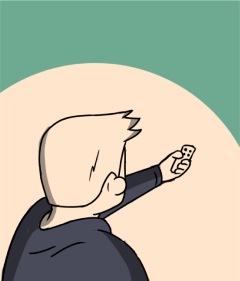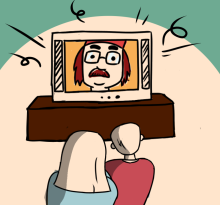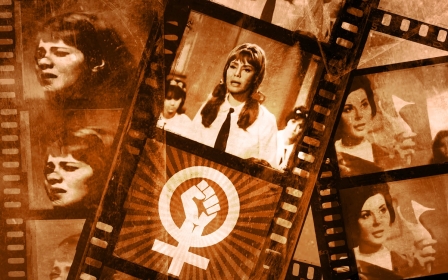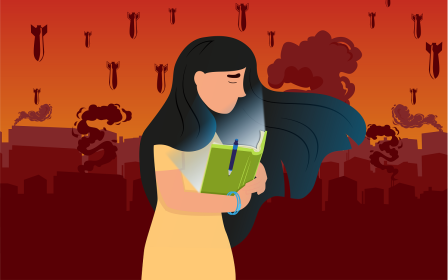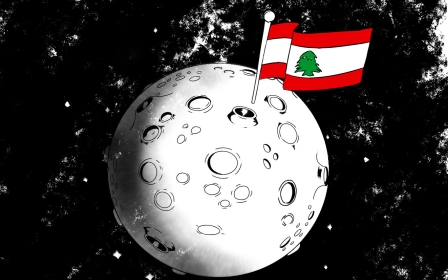How a Syrian comedian brought my Arab American family together

Whenever possible, I make a pilgrimage to my parents’ house, two states away, with my three young children. The kids love it because their grandma’s food is the best (they’re correct) and Seedo (grandad) plays cards and tawla (backgammon) with them.
Because of the Covid-19 pandemic, this hasn’t been possible, and I miss these times, probably because going home feels like swimming back to the security of the shore. I miss the simpler, more straightforward years of my childhood, even though they didn’t seem so easy back then.
During my last visit, I floated back to a time when happiness meant staying up late with my father to watch Ghawar al-Toshi, one of the most popular characters in Arabic-language films and television.
Watching Ghawar, portrayed by Syrian comedian Duraid Lahham, is an old tradition in our Arab-American family. That night, we watched him in Sah El Noum, a Syrian film based on a 1970s series of the same name, directed by Khaldoun al-Maleh.
The film debuted in 1975, making it as old as I am. It was recommended by a good friend who grew up in Canada; he’d also spent his childhood watching Ghawar with his immigrant father, and he insisted it was Lahham’s best film, claiming he always caught something new in it.
The premise of Sah El Noum is a typical one: Ghawar is a hotel worker infatuated with his belligerent boss, Fatoum, who enjoys berating him for one blunder after another. Despite his dubious chances, he’s devising ways to impress her so that she’ll marry him.
In an early scene, Ghawar swipes a hard-boiled egg from a street vendor and walks away. As Ghawar passes by a stranger, he nonchalantly reaches out and, without warning, smashes his egg on the man’s forehead.
My father and I burst into laughter at this unexpected moment.
Ghawar succeeded again.
Blending different identities
Ghawar al-Toshi is a character beloved throughout the Arabic-speaking world, but he also holds tremendous importance for people like me, the children of Arab immigrants, who spent our lives straddling two cultures.
Lahham’s character was a gateway to the world of our parents. He and his band of comedians created films where your Arabic didn’t have to be miyah bil miyah - perfect - to understand the jokes, because his humour was physical as well as verbal. Cracking an egg on a stranger’s forehead is comedy gold, in any language.
As a teenager, those conversations grew more intense. We struggled over something more nuanced, but vital: my cultural identity in the United States. How American was I becoming? Was I losing my Arab identity?
In some of my clearest childhood memories, I am sitting cross-legged in front of the large TV in our small living room, giggling as Ghawar slurps his soup loudly enough to startle the whole restaurant, or cracking up as he deflates the motorcycle tyres of his nemesis.
I’d look back at my parents, catch their eyes, and we’d laugh together. Those moments felt special, especially since many of our conversations around being Arab were more fraught.
And yet, we could still compromise by switching on that mischievous face, which appealed equally to two generations, each on opposite sides of the experience of arrival in America. My immigrant parents, who arrived in the US in 1967, had adapted to and liked American life, but mourned home, while I felt constantly pulled in two.
While I often despaired that my American friends did not accept me for being Arab, I also felt angry that my Arab parents did not understand me.
Later, I learned that lesson that causes all new grandparents to smile in satisfaction: it’s easy to judge your own parents, at least until you become a parent yourself.
Feeling eternally lost
Almost a decade ago, I lost my toddler son in a crowded Walmart, and for those four minutes, I was sure I’d been dropped into hell. Panic flooded my body even as I called his name and yelled out his description to store employees: “He’s a little guy, blue hoodie, black hair, brown eyes.”
His older sister, already clever at the age of four, called out, “Come out, George… Mama has candy.” Her trick worked: he popped out from behind a large stroller box under a display shelf.
I was playing with identities, the way children assemble puzzles, trying different pieces in hopes that one would fit
Here’s the thing, I realized later, after grabbing him, my other two children, and hurrying out of the store to the security of the child-gates in my own home: he’d had no idea he’d been lost.
I know that my parents, raising their children in a new country, experienced a less-panicked version of my experience regularly: they fretted over the fact that, as we made our way through American life as Arabs, we might become unanchored and never know it.
To grow up in North America to Arab immigrant parents is to be eternally lost, but to be unaware of your condition. You imagine instead that you are playing, exploring. As a child, I watched Ghawar as well as Punky Brewster. I ate warak dawali - stuffed vine leaves - as well as hot dogs. Sometimes I was in the mood for Bruce Springsteen’s raspy voice, and sometimes for Fayrouz’s crystal one.
Now, looking back, I realize that I was playing with identities, the way children assemble puzzles, trying different pieces in hopes that one would fit.
As I got older, moving back and forth between cultures became less about exploring and more about experiencing isolation. As a teenager, I understood that my friends viewed me as “Arab,” foreign, other.
It was a sudden shift, one that occurred during the first Persian Gulf War, when classmates called me names and accused me of being a terrorist. My identity never recovered.
Visiting Palestine a few years later brought little relief, as my relatives in the West Bank welcomed me but viewed me as “American”. I was the cousin who amused them as I awkwardly tried to fit in, who seemed ill-at-ease, even though they suspected I was living the good life in the United States.
How could I explain to them that I often felt lonely back in the States, even in my own home?
My parents didn’t understand my world, and theirs to me often seemed inaccessible. My life was like a rapid-fire Arabic conversation, during which I only understood 75 percent of what was being said.
That said, the love that permeated my childhood home needed no translation. There was oud-playing, there were hugs, there was laughter.
Being raised by immigrants is a unique experience, but your upbringing does not adhere to a clear outline. There is no template. Rather, you are assembled like a mosaic, composed of varying stones, from different cultures and different traditions: some smooth, some rounded, some jagged, some broken.
Coming home
And now, the older I get, the more I fall to pieces. It’s probably why, as an adult, I crave the security of being tethered to something.
One of those ways is hanging out with my Baba (father), reliving simpler pleasures: eating oranges, drinking shai with peppermint, laughing over Ghawar clacking around in his wooden sandals, enjoying the rare feeling of being in step with my Arab identity.
I’m realizing that life doesn’t move in a straight line, that dreams deviate and mutate out of necessity, anxieties you never knew you had emerge to surprise you.
In Sah El-Noum, one of Ghawar’s fears comes to fruition: the love of his life, Fatoum, sets her eyes on another man, a renowned musical composer called Husni. Jealous, Ghawar cuts the strings on Husni’s qanun - all except the one in the centre.
As an adult, I crave the security of being tethered to something. One of those ways is hanging out with my Baba
Husni immediately suspects Ghawar, who is summoned by Fatoum to explain himself. He was just trying to make Husni’s work easier, Ghawar says, with his devilishly innocent grin.
“You see,” he explains, waggling his fingers, “when one plays the qanun, he’s really just looking for this middle string anyway.”
As I shriek with laughter, sitting with my Baba, feeling at peace, I’m grateful to Ghawar for making this moment easy to locate.
Even when things from either end have been severed, I still have that middle string, that strong centre, and it can still produce music.
Middle East Eye delivers independent and unrivalled coverage and analysis of the Middle East, North Africa and beyond. To learn more about republishing this content and the associated fees, please fill out this form. More about MEE can be found here.


